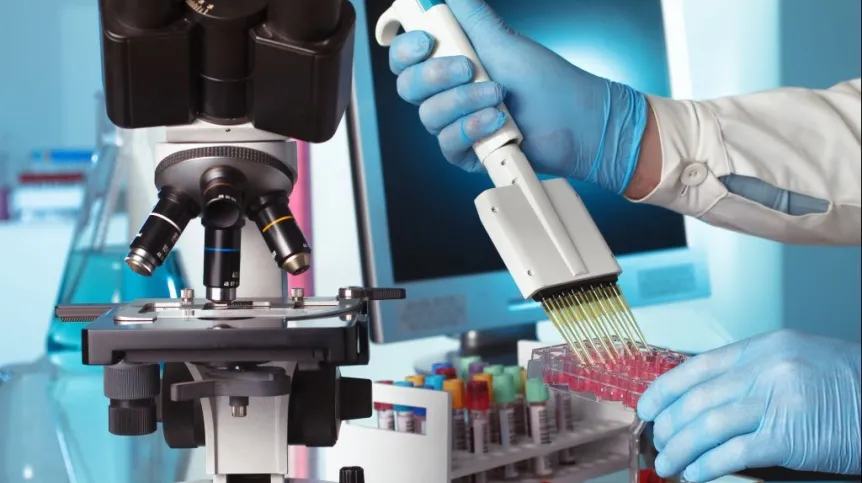
A new gene called ATRIP, whose mutations cause a high risk of breast cancer, has been discovered by Polish researchers in cooperation with scientists from Canada, reports Dr. Cezary Cybulski, a geneticist from the Department of Genetics and Pathomorphology of the Pomeranian Medical University in Szczecin.
The other team leader was Dr. Mohammad Akbari of the University of Toronto.
The Polish and Canadian scientists' research results have been published in the prestigious American Journal of Human Genetics. According to the authors of the study, they may translate into better diagnosis and treatment of women with breast cancer.
Dr. Cezary Cybulski from the Department of Genetics and Pathomorphology of the Pomeranian Medical University explains that the association between the ATRIP mutation and the occurrence of breast cancer was detected in a study of 16,000 women. women with breast cancer and 9,000 healthy women from the Polish population.
Dr. Cybulski said: “We have sequenced the entire genome and identified one repetitive mutation in the ATRIP gene in a genetically homogeneous Polish population. The mutation is responsible for shortening the protein encoded in the ATRIP gene.”
The number of carriers of this ATRIP gene mutation in Poland is estimated at approx. 25,000. Researchers have calculated that in carriers of the 'Polish' mutation, the risk of developing breast cancer is most likely more than two times higher and exceeds 20 percent. “If relatives of carriers of this mutation have been diagnosed with this cancer, the risk is over 30 percent,” Dr. Cybulski said.
In addition, the analysis of data from the British biobank (450,000 people) allowed scientists to conclude that pathogenic mutations of the ATRIP gene more than triple the risk of breast cancer in the UK (more mutations were discovered in the British population - PAP). The presence of ATRIP mutations in the UK suggests that they are most likely the cause of breast cancer in many other ethnic groups around the world.
Later this year Polish patients will have the opportunity to check during diagnostic tests whether they are carriers of the mutated ATRIP gene.
Cybulski said: “In the case of a positive result, we will recommend earlier preventive examinations to patients - breast ultrasound from the age of 25 and mammography from the age of 35.”
According to the researcher, because cancers in women with ATRIP mutation have impaired DNA repair by homologous recombination (just like cancers with mutations in BRCA genes), they are likely to respond well to chemotherapy (e.g. cisplatin) as well as treatment with PARP inhibitors.
Dr. Cybulski said the latest discovery will lead to a simple and cheap test to detect mutations in the ATRIP gene. This test can be added to the test that detects about 10 percent of cases of breast cancer in Polish women, by examining a panel of several repetitive mutations of BRCA1, BRCA2, CHEK2, PALB2, NBN, RECQL genes in Poland. The sensitivity of such a test in detecting mutations of the above genes in Poland is over 80 percent.
The development of tests based on the so-called founder mutations is possible in genetically homogeneous populations, such as the Polish population.
In Cybulski’s opinion, screening for founder mutations offers the possibility of cheap, fast, very sensitive diagnosis of high-risk cancers in Poland and should be performed in the first line of diagnosis of hereditary predisposition to breast cancer, before complex and expensive tests based on next-generation sequencing.
Dr. Cybulski added that mutations in the genes that control DNA repair are associated with a multi-organ predisposition to cancer. This happens, for example, in the case of mutations in the BRCA genes (BRCA1 and BRCA2), which have been linked not only to the risk of breast cancer, but also ovarian, peritoneal, prostate and pancreatic cancer. Therefore, scientists are currently investigating the links between mutations in the ATRIP gene and other malignancies, including ovarian cancer.
The new gene was discovered in a National Science Centre project carried out at the Department of Genetics and Pathomorphology of the Pomeranian Medical University in Szczecin, headed by Professor Jan Lubiński, in collaboration with the Women's College Research Institute of the University of Toronto. (PAP)
PAP - Science in Poland, Joanna Morga
jjj/ agt/ kap/
tr. RL













